PREMIUM CONTENT
Japan’s decision to commence the release of treated radioactive water from the ruined Fukushima nuclear plant on August 24 has taken center stage on Chinese social media this week.
These days, Weibo and other Chinese social media platforms saw a surge of state media slogans directed against Japan, as well as furious posts from well-known bloggers and regular netizens.
Japan will release the treated water stored in tanks at the site into the ocean over the duration of about 17 days, but that is only for this first batch. The release of all the wastewater is estimated to take about 30 years.
Japan’s plans to discharge wastewater from the Fukushima nuclear plant, which was severely damaged by the Tōhoku earthquake and tsunami on March 11 of 2011, were found to be consistent with international safety standards by the International Atomic Energy Agency earlier this year. Following the tsunami, over 1.3 million cubic meters of seawater were employed to cool the damaged reactor cores and prevent overheating.
Some scientists argue that the continued storage of cooling water in tanks, which are running out of storage, might pose a far greater risk compared to treating and diluting the water before releasing it into the ocean.
However, there is a significant range of opinions on this matter, and numerous voices oppose the intentional release of hazardous substances into the environment. Concerns are prevalent regarding the potential long-term effects on human health, wildlife, and the local fishing industry.
Foreign criticism, much seen on Twitter, that Chinese nuclear plants have allegedly released far more radiation into the sea, is ‘debunked’ by Chinese netizens by posting an image that is supposed to show the difference in the kind of water that is discharged: the ‘clean’ water (top) and the contaminated water (buttom). Instead of scientifically-backed information, the content that is mainly gaining traction these days is driven by emotions, anxiety, distrust, and nationalism.
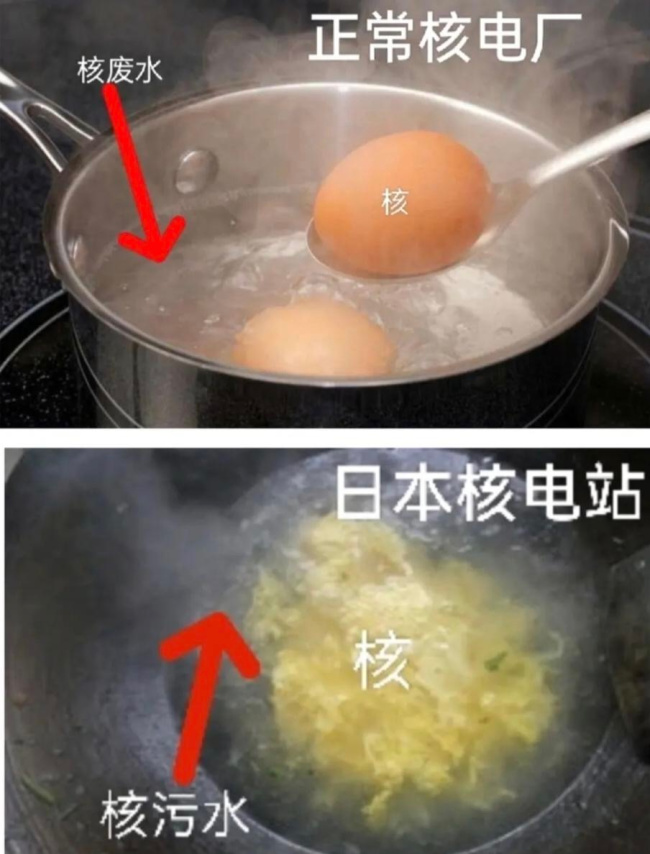
Meme showing “normal” nuclear wastewater compared to the Fukushima wastewater.
Over the past two days, at least five out of the top ten trending topics on Baidu’s hot news lists and the Weibo platform are linked to the discharge from the nuclear plant and its potential direct and indirect consequences.
We explain the top 5 biggest hashtags on Chinese social media and what’s behind them.
ANTI-JAPANESE SENTIMENTS
1: History Will Remember #历史会记住日本政府这一笔#
Among the top trending topics related to Japan’s release of Fukushima water is that “History will remember this move by the Japanese government” (#历史会记住日本政府这一笔#).
This phrase, turned into a hashtag, was initiated by Chinese state media outlet CCTV and also propagated by other official media, including China News Service.
![]()
Post by CCTV, screenshot by What’s on Weibo.
“The people will remember, all the living creatures will remember,” one popular blogger’s post said, including various images of cute water animals. Other bloggers also followed with similar posts, writing things such as, “The sea otters will remember,” or “the entire world will remember what the Japanese government did this day [August 24].”
![]()
![]()
One post claimed that “the sea otters will also remember.”
While the expression pertains to the ecological consequences of the Fukushima water release, it also situates the incident within a broader historical framework where Japan assumes an aggressor role, with many online posts making direct or indirect references to the Second Sino-Japanese War (1937-1945) and WWII while voicing hate against Japan.
One Weibo user wrote: “History remembers, but the damned devils forget again. Do they remember the Anti-Japanese War? Are their brain cells telling them to destroy the earth?” Many other posts called Japan’s leadership “inhumane” and “evil.”
![]()
Online propaganda posters condeming Japan, by CCTV and Xinhua.
As is often done when there are major international clashes, Chinese state media outlets released online posters and slogans in relation to the event. In the Xinhua one, Japan was called a “destroyer” and “polluter.”
In an online media sphere where anti-Japanese voices are already ubiquitous in regular times, this ongoing event is another catalyst, igniting a resurgence of cybernationalism and intensified anti-Japanese rhetoric.
FOOD SAFETY & ANXIETY
2: China Suspends Import of Japanese Seafood #中方暂停进口日本水产品是完全必要的#
A second prominent subject of discussion is China’s decisive move to suspend the import of all Japanese aquatic products, which is deemed “absolutely necessary” (#中方暂停进口日本水产品是完全必要的#, 790 million views). Since the Fukushima disaster in 2011, China had already banned the import of almost all food products from prefectures near Fukushima.
China-based restaurants or online shops are also strictly prohibited from preparing and selling seafood products originating from Japan (#严禁采买日本水产品网络销售#, 85 million views).
While these news reports and related hashtags pages are initiated by state media outlets, like Global Times (环球网) and People’s Daily (人民日报), they also strike a chord with Chinese online users who harbor concerns about the potential direct repercussions of the Fukushima water release. The decision to entirely halt the import of Japanese aquatic products is decided by higher authorities, and reinforced by overwhelming public support.
This public support also arises from concerns about the implications of Japan’s decision for the well-being of Chinese citizens. These anxieties are intensified by reports in Chinese media, such as a recent one that highlighted “heavy rainfall in Osaka on the day of nuclear water discharge” (#日本核污染水排海当天大阪突降暴雨#, 230 million views). This report insinuated a direct link between the water discharge and the sudden rainstorm.
REPEATING PATTERNS
3: Panic Buying of Salt #中盐集团回应食盐抢购现象#
The commotion surrounding the news that Japan would start discharging the contaminated water into the ocean has led to people hoarding salt in supermarkets across the country. Online shops also ran out of salt.
![]()
Some online photos showed people leaving the supermarket with boxes filled with bags of salt.
The rush to hoard salt originates from worries about salt shortages, but it’s also driven by the belief that salt can act as an antidote for radiation poisoning. However, table salt is actually not advised to be used as a substitute for potassium iodide (KI) as it does not help with radiation poisoning, and eating large amounts could be harmful.
Panic buying before a lockdown? No, those days are over. It's hoarding salt in light of Japan's move to start discharging treated Fukushima water into the ocean, which has sparked consumer concerns over salt supplies combined with idea that salt can help protect against radiation pic.twitter.com/BLfgvGBRzT
— Manya Koetse (@manyapan) August 25, 2023
The surge in panic buying is tied to concerns about the repercussions of radioactive water in the sea. However, it also reflects a recurring pattern witnessed over the three years of dealing with Covid in China and pre-lockdown hoarding tendencies (see for example, or here), giving people a sense of control in a situation that is out of their control.
Meanwhile, salt industry associations and groups nationwide have appealed to the public not to engage in panic buying or hoarding of salt, stating that China has plenty of salt resources and that 90% of its salt production is not sea salt and remains completely unaffected by Japan’s nuclear pollution (#中盐集团回应食盐抢购现象#, 170 million views).
CONSUMER ACTIVISM
4: Consumer Boycott of Japanese Cosmetics #多家日妆品牌遭遇退货#
In the aftermath of the Japanese government’s formal announcement regarding the release of treated nuclear water into the sea, a substantial number of Chinese netizens have not only expressed their intent to abstain from consuming Japanese food, but have also committed to refraining from purchasing other Japanese products, including cosmetics.
Japanese cosmetic brands, including SK-II, Shiseido and Kose, are usually very popular among Chinese consumers. But since June 2023, when the tests began to discharge treated radioactive wastewater into the sea, consumers raised concerns about the safety of products originating from Japan.
According to Jing Daily, an online poll was conducted via social media app Xiaohongshu at the time. Out of 4,472 participants surveyed, approximately 79 percent conveyed their intention to discontinue the use of Japanese skincare and makeup products due to safety apprehensions.
This week, in a Weibo poll conducted by Sina News, more than 90 percent of respondents expressed their determination to stop buying Japanese cosmetics. Meanwhile, the hashtag “Several Japanese Cosmetic Brands See Items Returned” (#多家日妆品牌遭遇退货#, 120 million views), was among the top trending hashtags on Weibo.
This not only highlights their concerns about the safety of these products but also reflects a form of consumer nationalism, where boycotting Japanese goods becomes a manifestation of political activism.
The nationalistic intent behind this consumer behavior is emphasized by the state media outlet People’s Daily. They reported a news item about Chinese consumers purportedly returning Japanese cosmetics under the slogan: “We Endorse Made-in-China” (#我为国货代言#).
HIGHLIGHTING JAPANESE PROTEST AT HOME
5: The People Can’t Bear It #日本核污染水排海民众忍无可忍#
Other trending hashtags highlight how Japanese people themselves are also allegedly opposing their government’s decision to release Fukushima water.
One trending hashtag, “People Can’t Bear Japan Discharging Nuclear-Contaminated Water Into the Sea” (#日本核污染水排海民众忍无可忍#), has garnered over 710 million views on Weibo. It showcases how Fukushima residents expressed their concerns to Chinese reporters, criticizing the Japanese government and reiterating their opposition to the decision to release the radioactive water into the ocean.
Another popular hashtag is “Japan Scolded for Promoting Nuclear Contaminated Water to Students” (#日本向学生宣传核污水安全被骂#, 110 million views). Since 2021, the Japanese government allegedly distributed pamphlets at schools around the country to promote the “safety” and “lack of impact on health” of nuclear contaminated water.
Chinese media report how local educators have criticized these pamphlets for “deceiving innocent children.”
While there is an online inclination to distinguish between the Japanese government and the Japanese people, there are also online trends that criticize Japanese residents. For instance, there’s a story circulating about Japanese individuals swimming in the sea on August 25 (#核污水排海后日本人在海里游泳#). Some comments read, “You see, they just don’t care,” while many others exhibit clear anti-Japanese sentiments, saying, “Let them swim in it and drink their contaminated water.”
In light of the waves of anti-Japanese sentiments that China’s online media environment has seen over the past few days, the Japanese embassy in Beijing issued a warning to Japanese citizens in China on its website on August 25. They advise Japanese citizens to be careful when going out, and to refrain from “unnecessarily speaking Japanese loudly” (#日本大使馆提醒在华日本民众不要大声说日语#).
Meanwhile, at the time of writing, another Japan-related hashtag has surged to the number one spot on Weibo’s top trending lists, namely “Two Earthquakes In One Day” (#日本一天内两次地震#, 210 million views), about Japan experiencing two offshore earthquakes. “It’s karma,” many commenters write, with others also echoing a popular view: “It’s not a coincidence. The heavens are watching.”
By Manya Koetse
With contributions by Miranda Barnes
Get the story behind the hashtag. Subscribe to What’s on Weibo here to receive our newsletter and get access to our latest articles:
Spotted a mistake or want to add something? Please let us know in comments below or email us. First-time commenters, please be patient – we will have to manually approve your comment before it appears.
©2023 Whatsonweibo. All rights reserved. Do not reproduce our content without permission – you can contact us at info@whatsonweibo.com.
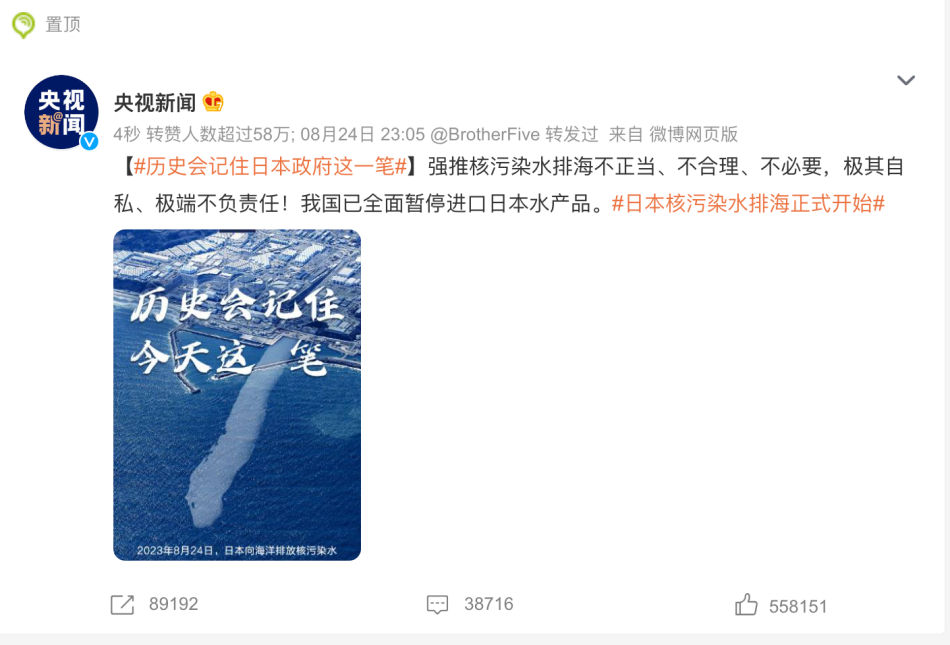
Post by CCTV, screenshot by What’s on Weibo.
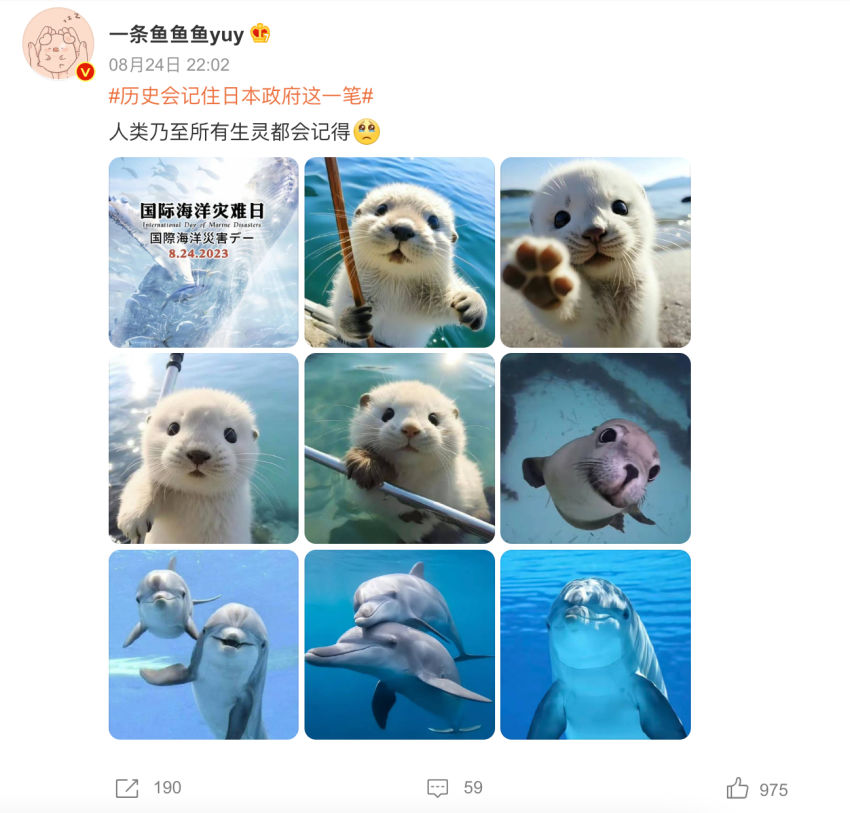
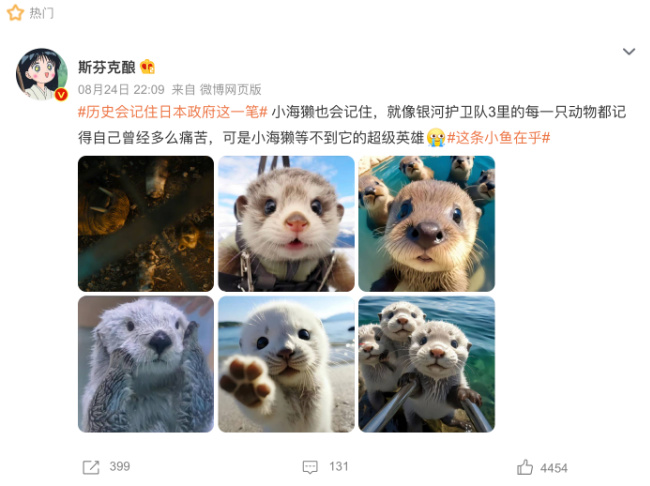
One post claimed that “the sea otters will also remember.”
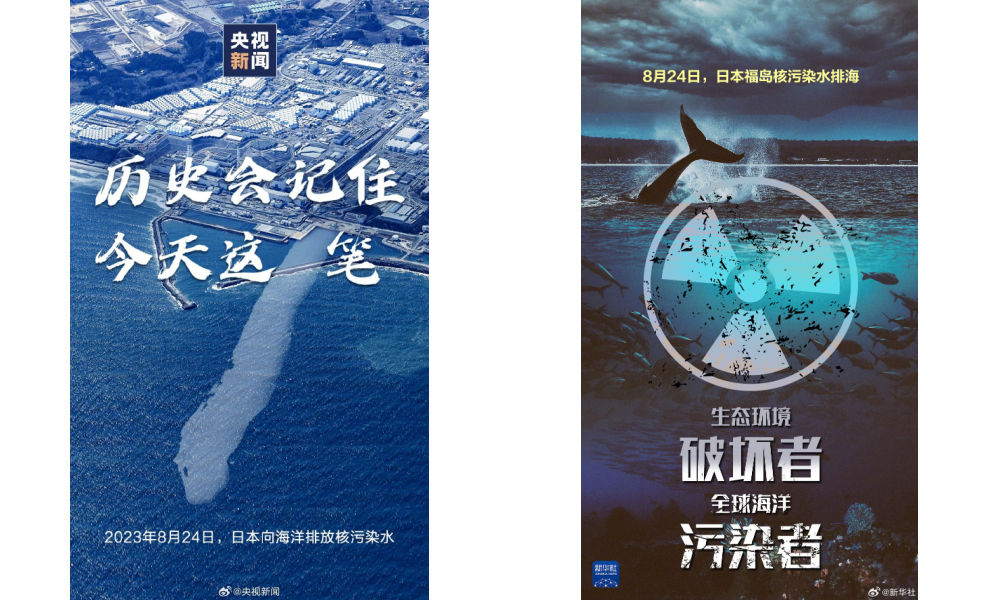
Online propaganda posters condeming Japan, by CCTV and Xinhua.
FOOD SAFETY & ANXIETY
A second prominent subject of discussion is China’s decisive move to suspend the import of all Japanese aquatic products, which is deemed “absolutely necessary” (#中方暂停进口日本水产品是完全必要的#, 790 million views). Since the Fukushima disaster in 2011, China had already banned the import of almost all food products from prefectures near Fukushima.
China-based restaurants or online shops are also strictly prohibited from preparing and selling seafood products originating from Japan (#严禁采买日本水产品网络销售#, 85 million views).
While these news reports and related hashtags pages are initiated by state media outlets, like Global Times (环球网) and People’s Daily (人民日报), they also strike a chord with Chinese online users who harbor concerns about the potential direct repercussions of the Fukushima water release. The decision to entirely halt the import of Japanese aquatic products is decided by higher authorities, and reinforced by overwhelming public support.
This public support also arises from concerns about the implications of Japan’s decision for the well-being of Chinese citizens. These anxieties are intensified by reports in Chinese media, such as a recent one that highlighted “heavy rainfall in Osaka on the day of nuclear water discharge” (#日本核污染水排海当天大阪突降暴雨#, 230 million views). This report insinuated a direct link between the water discharge and the sudden rainstorm.
REPEATING PATTERNS
3: Panic Buying of Salt #中盐集团回应食盐抢购现象#
The commotion surrounding the news that Japan would start discharging the contaminated water into the ocean has led to people hoarding salt in supermarkets across the country. Online shops also ran out of salt.
![]()
Some online photos showed people leaving the supermarket with boxes filled with bags of salt.
The rush to hoard salt originates from worries about salt shortages, but it’s also driven by the belief that salt can act as an antidote for radiation poisoning. However, table salt is actually not advised to be used as a substitute for potassium iodide (KI) as it does not help with radiation poisoning, and eating large amounts could be harmful.
Panic buying before a lockdown? No, those days are over. It's hoarding salt in light of Japan's move to start discharging treated Fukushima water into the ocean, which has sparked consumer concerns over salt supplies combined with idea that salt can help protect against radiation pic.twitter.com/BLfgvGBRzT
— Manya Koetse (@manyapan) August 25, 2023
The surge in panic buying is tied to concerns about the repercussions of radioactive water in the sea. However, it also reflects a recurring pattern witnessed over the three years of dealing with Covid in China and pre-lockdown hoarding tendencies (see for example, or here), giving people a sense of control in a situation that is out of their control.
Meanwhile, salt industry associations and groups nationwide have appealed to the public not to engage in panic buying or hoarding of salt, stating that China has plenty of salt resources and that 90% of its salt production is not sea salt and remains completely unaffected by Japan’s nuclear pollution (#中盐集团回应食盐抢购现象#, 170 million views).
CONSUMER ACTIVISM
4: Consumer Boycott of Japanese Cosmetics #多家日妆品牌遭遇退货#
In the aftermath of the Japanese government’s formal announcement regarding the release of treated nuclear water into the sea, a substantial number of Chinese netizens have not only expressed their intent to abstain from consuming Japanese food, but have also committed to refraining from purchasing other Japanese products, including cosmetics.
Japanese cosmetic brands, including SK-II, Shiseido and Kose, are usually very popular among Chinese consumers. But since June 2023, when the tests began to discharge treated radioactive wastewater into the sea, consumers raised concerns about the safety of products originating from Japan.
According to Jing Daily, an online poll was conducted via social media app Xiaohongshu at the time. Out of 4,472 participants surveyed, approximately 79 percent conveyed their intention to discontinue the use of Japanese skincare and makeup products due to safety apprehensions.
This week, in a Weibo poll conducted by Sina News, more than 90 percent of respondents expressed their determination to stop buying Japanese cosmetics. Meanwhile, the hashtag “Several Japanese Cosmetic Brands See Items Returned” (#多家日妆品牌遭遇退货#, 120 million views), was among the top trending hashtags on Weibo.
This not only highlights their concerns about the safety of these products but also reflects a form of consumer nationalism, where boycotting Japanese goods becomes a manifestation of political activism.
The nationalistic intent behind this consumer behavior is emphasized by the state media outlet People’s Daily. They reported a news item about Chinese consumers purportedly returning Japanese cosmetics under the slogan: “We Endorse Made-in-China” (#我为国货代言#).
HIGHLIGHTING JAPANESE PROTEST AT HOME
5: The People Can’t Bear It #日本核污染水排海民众忍无可忍#
Other trending hashtags highlight how Japanese people themselves are also allegedly opposing their government’s decision to release Fukushima water.
One trending hashtag, “People Can’t Bear Japan Discharging Nuclear-Contaminated Water Into the Sea” (#日本核污染水排海民众忍无可忍#), has garnered over 710 million views on Weibo. It showcases how Fukushima residents expressed their concerns to Chinese reporters, criticizing the Japanese government and reiterating their opposition to the decision to release the radioactive water into the ocean.
Another popular hashtag is “Japan Scolded for Promoting Nuclear Contaminated Water to Students” (#日本向学生宣传核污水安全被骂#, 110 million views). Since 2021, the Japanese government allegedly distributed pamphlets at schools around the country to promote the “safety” and “lack of impact on health” of nuclear contaminated water.
Chinese media report how local educators have criticized these pamphlets for “deceiving innocent children.”
While there is an online inclination to distinguish between the Japanese government and the Japanese people, there are also online trends that criticize Japanese residents. For instance, there’s a story circulating about Japanese individuals swimming in the sea on August 25 (#核污水排海后日本人在海里游泳#). Some comments read, “You see, they just don’t care,” while many others exhibit clear anti-Japanese sentiments, saying, “Let them swim in it and drink their contaminated water.”
In light of the waves of anti-Japanese sentiments that China’s online media environment has seen over the past few days, the Japanese embassy in Beijing issued a warning to Japanese citizens in China on its website on August 25. They advise Japanese citizens to be careful when going out, and to refrain from “unnecessarily speaking Japanese loudly” (#日本大使馆提醒在华日本民众不要大声说日语#).
Meanwhile, at the time of writing, another Japan-related hashtag has surged to the number one spot on Weibo’s top trending lists, namely “Two Earthquakes In One Day” (#日本一天内两次地震#, 210 million views), about Japan experiencing two offshore earthquakes. “It’s karma,” many commenters write, with others also echoing a popular view: “It’s not a coincidence. The heavens are watching.”
By Manya Koetse
With contributions by Miranda Barnes
Get the story behind the hashtag. Subscribe to What’s on Weibo here to receive our newsletter and get access to our latest articles:
Spotted a mistake or want to add something? Please let us know in comments below or email us. First-time commenters, please be patient – we will have to manually approve your comment before it appears.
©2023 Whatsonweibo. All rights reserved. Do not reproduce our content without permission – you can contact us at info@whatsonweibo.com.
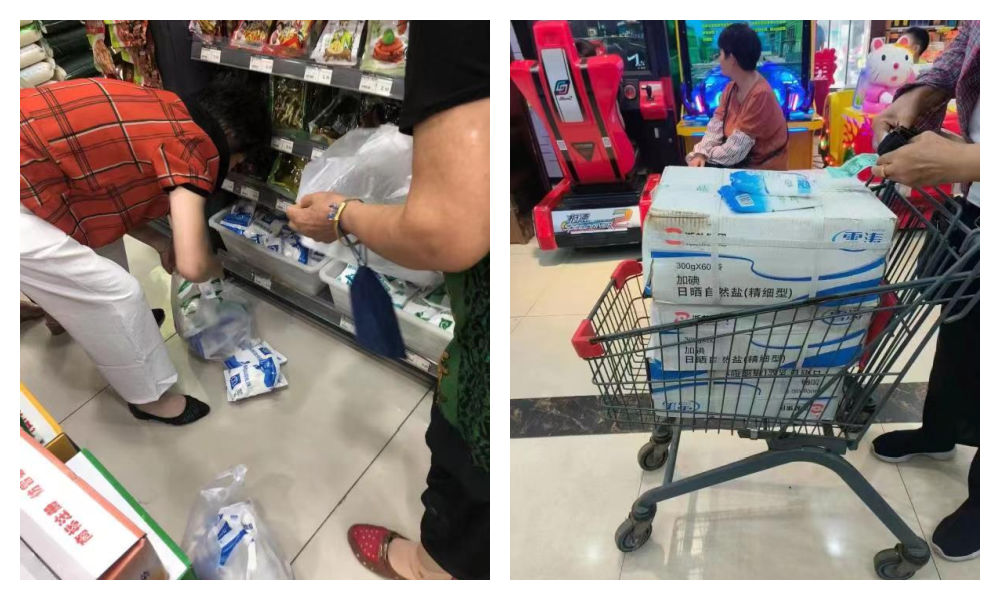
Some online photos showed people leaving the supermarket with boxes filled with bags of salt.
Panic buying before a lockdown? No, those days are over. It's hoarding salt in light of Japan's move to start discharging treated Fukushima water into the ocean, which has sparked consumer concerns over salt supplies combined with idea that salt can help protect against radiation pic.twitter.com/BLfgvGBRzT
— Manya Koetse (@manyapan) August 25, 2023
CONSUMER ACTIVISM
In the aftermath of the Japanese government’s formal announcement regarding the release of treated nuclear water into the sea, a substantial number of Chinese netizens have not only expressed their intent to abstain from consuming Japanese food, but have also committed to refraining from purchasing other Japanese products, including cosmetics.
Japanese cosmetic brands, including SK-II, Shiseido and Kose, are usually very popular among Chinese consumers. But since June 2023, when the tests began to discharge treated radioactive wastewater into the sea, consumers raised concerns about the safety of products originating from Japan.
According to Jing Daily, an online poll was conducted via social media app Xiaohongshu at the time. Out of 4,472 participants surveyed, approximately 79 percent conveyed their intention to discontinue the use of Japanese skincare and makeup products due to safety apprehensions.
This week, in a Weibo poll conducted by Sina News, more than 90 percent of respondents expressed their determination to stop buying Japanese cosmetics. Meanwhile, the hashtag “Several Japanese Cosmetic Brands See Items Returned” (#多家日妆品牌遭遇退货#, 120 million views), was among the top trending hashtags on Weibo.
This not only highlights their concerns about the safety of these products but also reflects a form of consumer nationalism, where boycotting Japanese goods becomes a manifestation of political activism.
The nationalistic intent behind this consumer behavior is emphasized by the state media outlet People’s Daily. They reported a news item about Chinese consumers purportedly returning Japanese cosmetics under the slogan: “We Endorse Made-in-China” (#我为国货代言#).
HIGHLIGHTING JAPANESE PROTEST AT HOME
5: The People Can’t Bear It #日本核污染水排海民众忍无可忍#
Other trending hashtags highlight how Japanese people themselves are also allegedly opposing their government’s decision to release Fukushima water.
One trending hashtag, “People Can’t Bear Japan Discharging Nuclear-Contaminated Water Into the Sea” (#日本核污染水排海民众忍无可忍#), has garnered over 710 million views on Weibo. It showcases how Fukushima residents expressed their concerns to Chinese reporters, criticizing the Japanese government and reiterating their opposition to the decision to release the radioactive water into the ocean.
Another popular hashtag is “Japan Scolded for Promoting Nuclear Contaminated Water to Students” (#日本向学生宣传核污水安全被骂#, 110 million views). Since 2021, the Japanese government allegedly distributed pamphlets at schools around the country to promote the “safety” and “lack of impact on health” of nuclear contaminated water.
Chinese media report how local educators have criticized these pamphlets for “deceiving innocent children.”
While there is an online inclination to distinguish between the Japanese government and the Japanese people, there are also online trends that criticize Japanese residents. For instance, there’s a story circulating about Japanese individuals swimming in the sea on August 25 (#核污水排海后日本人在海里游泳#). Some comments read, “You see, they just don’t care,” while many others exhibit clear anti-Japanese sentiments, saying, “Let them swim in it and drink their contaminated water.”
In light of the waves of anti-Japanese sentiments that China’s online media environment has seen over the past few days, the Japanese embassy in Beijing issued a warning to Japanese citizens in China on its website on August 25. They advise Japanese citizens to be careful when going out, and to refrain from “unnecessarily speaking Japanese loudly” (#日本大使馆提醒在华日本民众不要大声说日语#).
Meanwhile, at the time of writing, another Japan-related hashtag has surged to the number one spot on Weibo’s top trending lists, namely “Two Earthquakes In One Day” (#日本一天内两次地震#, 210 million views), about Japan experiencing two offshore earthquakes. “It’s karma,” many commenters write, with others also echoing a popular view: “It’s not a coincidence. The heavens are watching.”
By Manya Koetse
With contributions by Miranda Barnes
Get the story behind the hashtag. Subscribe to What’s on Weibo here to receive our newsletter and get access to our latest articles:
Spotted a mistake or want to add something? Please let us know in comments below or email us. First-time commenters, please be patient – we will have to manually approve your comment before it appears.
©2023 Whatsonweibo. All rights reserved. Do not reproduce our content without permission – you can contact us at info@whatsonweibo.com.
The post “History Won’t Forget”: Chinese Reactions to Japan’s Fukushima Water Release in 5 Trending Hashtags appeared first on What's on Weibo.